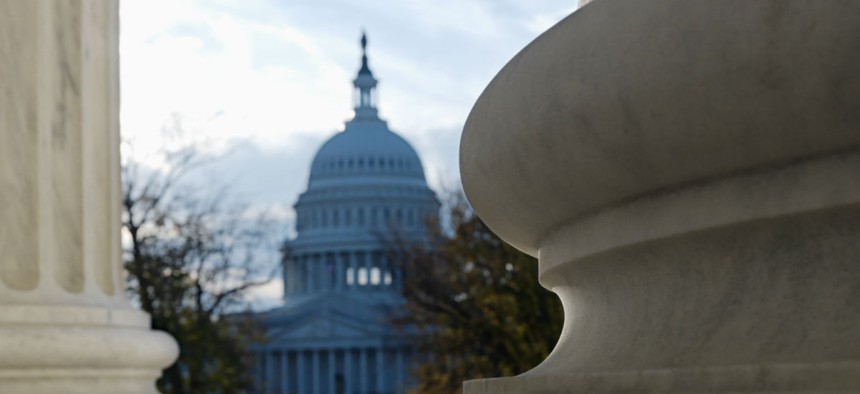CBO Delivers More Grim Fiscal News That Could Irk Congress
Agency defends against attacks while highlighting new debt and deficit woes.
Congress’s resident Cassandra, officially the Congressional Budget Office, reported on Wednesday that lower-than-projected revenue receipts added to the budget deficit and accelerated the day of reckoning for lawmakers to raise the debt ceiling.
The nonpartisan arm of Congress—which has come under attack from Republicans in recent years for its estimates of how tax cuts and healthcare spending would impact the deficit—pointed to revenue losses associated with the new tax law. In short, employers are withholding less money from taxpayers’ paychecks, and that’s affecting the U.S. Treasury’s bottom line.
“CBO previously projected that the extraordinary measures would be exhausted and the Treasury would run out of cash sometime in late March or early April 2018,” its analysts noted. “After incorporating the anticipated effects of recent tax legislation and actual spending and revenue amounts in December into its calculations, CBO now projects the range of possible dates as falling earlier in March.”
Explaining that the previous debt limit expired on Sept. 8, 2017, CBO cited the Treasury Department’s “debit issuance suspension period” that allows “extraordinary measures” to borrow additional funds. If Congress, which is still grappling with the fiscal 2018 budget and a possible government shutdown next week, doesn’t act to raise the limit by March, “the government would be unable to pay its obligations fully, and it would delay making payments for its activities, default on its debt obligations, or both,” CBO said.
Though total cash receipts rose by 4 percent in the first quarter of fiscal 2018, CBO said, outlays under the Trump administration and Congress’s new spending rose 5 percent.
On Tuesday, Treasury Secretary Steven Mnuchin appeared before the Senate Banking, Housing and Urban Affairs Committee to request a hike in the debt ceiling, while also touting the new tax law that CBO (with the Joint Tax Committee) has projected as adding $1.46 trillion to the deficit over 10 years.
“As Congress has not acted to suspend or increase the debt ceiling, I have determined that the [suspension period] will be extended into February and will be notifying Congress as such,” he said. “I respectfully urge Congress to act as soon as possible to protect the full faith and credit of the United States by increasing the statutory debt limit.”
The annual deficit, analysts using CBO data recently warned, could well rise from the current $666 billion as of Oct. 1, 2017, to over $1 trillion. (Republican backers of the tax bill, Mnuchin included, argue that its costs will be offset by a dramatic increase in tax revenue.)
The nonpartisan Committee for a Responsible Federal Budget, in an analysis released on Jan. 26, said, “Trillion-dollar deficits will return next year, and a budget deal in the coming weeks could make them much worse,” in part because the short-term continuing resolutions delayed revenues from three taxes in the Affordable Care Act.
“The passage of the CR means we now project, based on the Congressional Budget Office's June baseline, that trillion-dollar deficits [will] return next year rather than 2020 as we previously estimated,” the nonprofit wrote. “After the tax bill, we projected that the deficit would reach $983 billion in fiscal 2019 and $1.05 trillion in fiscal 2020. Now the CR will increase the deficit further to $1 trillion in 2019 and $1.06 trillion in 2020.”
Meanwhile, CBO Director Keith Hall on Tuesday testified before the House Budget Committee and published a related blog post stressing the value of his agency. “The agency offers an alternative to the information provided by the Office of Management and Budget in the executive branch,” he said, noting that Congress created CBO to strengthen its role in budgeting. “CBO follows processes specified in statute or developed by the agency in concert with the Budget Committees and congressional leadership.”
As an indicator of its productivity, Hall noted that CBO’s expert-but-stretched staff of 235 last year “published 740 formal cost estimates; provided technical assistance to congressional staff as they developed thousands of legislative proposals and amendments; and published many reports about the budget, the economy, and related issues.”
CBO’s analysts “always pursue high quality and accuracy. They approach issues with a detailed understanding of federal programs and the tax code,” he continued, and “they carefully and critically read the relevant research literature. “
CBO’s analysis, he said, is “objective, impartial and nonpartisan.” Its models and consultations with outsiders create a product “balanced by a rigorous system of checks and balances,” he said. Finally, CBO “is always looking for ways to do things better.”








